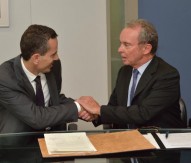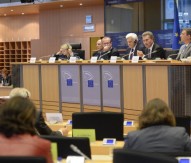
Dutch consortium agrees to develop Metropolitan Food Cluster
A new Dutch consortium, initiated by Climate-KIC, has signed an agreement to help reduce methane emissions from dairy farming.
The consortium was recently founded in Venlo in the Netherlands and currently consists of 16 partners, including Wageningen University & Research Centre, leading partner of the ‘Metropolitan Food Clusters for climate-proof agriculture by an increased resources use efficiency’ (MFC4CLIMAG) project, as well as several local agrarian businesses. Venlo is one of the two regions involved in the MFC4CLIMAG project. The farmers and agrarian businesses in this region are involved in the production of animal proteins, such as cattle and dairy farming.
In the MFC4CLIMAG project, the concept of Metropolitan Food Clusters (MFC) is being implemented in two demonstration areas, one near Venlo and the other near Berlin, Germany. The MFC concept involves a more sustainable, low-emission stable design and a regional feed and manure centre.
Gerben Mol, senior researcher at Wageningen University & Research Centre, commented: “The MFC concept has been developed to realise a highly resource-efficient, low climate and environmental impact, and at the same time highly productive way of agricultural production. This means optimising logistics, such as creating agro-parks, and integrating the value chains of different agricultural production lines, which make as efficient re-use of waste streams as possible.
This new, integrated production method is less damaging to the environment, but also holds a lot of economic promise. Mol added: “Finding innovative ways to use waste streams such as methane or manure can lead to less waste and a decreased climate burden. At the same time this means a higher cost effectiveness for the agro-businesses involved. An example is using the methane for energy production or heating. These functional connections should preferably be implemented close to where the waste is being produced. This can best be achieved in agro-business parks, where co-operation between various agro-entrepreneurs leads to the required waste volumes to make such solutions economically viable.”




